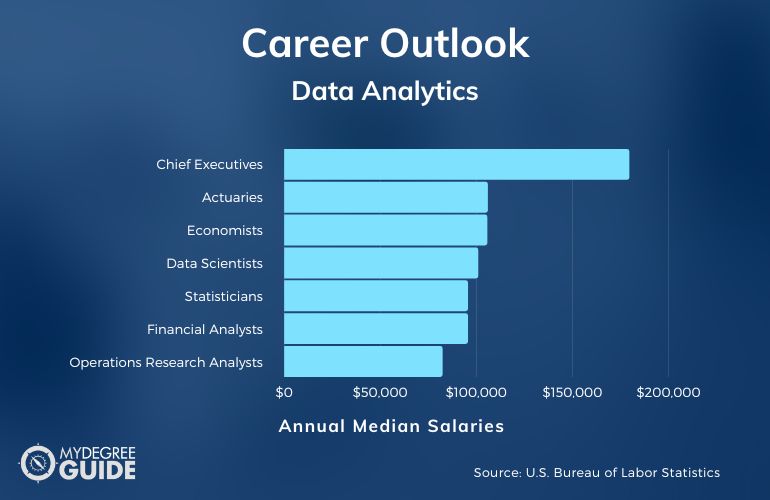A PhD in Data Analytics is a terminal degree that prepares students to become experts in data-based careers.

People who enter a PhD in Data Analytics program are usually passionate about making discoveries and performing in-depth research. Since these programs are heavily research-based, many students who enroll do so in hopes of entering the world of academics.
Editorial Listing ShortCode:
Graduates may also enter fields like research, business, healthcare, and government. Read on to see if a PhD program in data analytics is right for you!
Online PhD in Data Analytics Programs

A PhD in Data Analytics is a terminal degree program that teaches students how to gather and use data to inform the decisions of an organization.
This program is strategic for professionals looking to elevate their data expertise because it is the highest degree you can receive in a data-related field. If you have a love for numbers and data and have already completed your undergrad in a related discipline, then you might consider a PhD as the next step in your professional development.
One of the main factors of a PhD in Analytics program is that it is heavily research focused. Your education will also expose you to various courses that help you develop your data expertise. You’ll likely take advanced courses in subjects like:
- Statistics
- Probability
- Machine learning
- Interference
- Big data
That said, PhD programs give you practical exposure through the emphasis on research. Professionals who are more interested in a practice-oriented degree may consider earning a DBA in Data Analytics, which is a Doctor of Business Administration in Data Analytics.
Editorial Listing ShortCode:
Should you pursue a PhD in Data Analytics, you can expect the back half of your education to involve the completion of a dissertation. This can serve as the culmination of your education and be a testament to your newfound expertise.
Because data science plays a vital role in business, there are various positions that graduates can pursue. Some of these career paths include:
- Data scientist
- Data analyst
- Data Architect
- Data Engineer
- Statistician
- Researcher
- College professor
These represent only a few of the potential occupations available in this field. You can assess your academic and career goals to help determine if a PhD in Data Analytics is right for you.
Data Analytics Careers and Salaries

Careers in data analytics are plentiful, and PhD graduates are often viewed as experts in the field. According to the Bureau of Labor Statistics, here are the median wages of potential career paths related to data analytics and data science.
| Careers | Annual Median Salaries |
| Chief Executives | $179,520 |
| Actuaries | $105,900 |
| Economists | $105,630 |
| Data Scientists | $100,910 |
| Statisticians | $95,570 |
| Financial Analysts | $95,570 |
| Operations Research Analysts | $82,360 |
| Postsecondary Teachers | $79,640 |
| Market Research Analysts | $63,920 |
| Survey Researchers | $59,740 |
No career or salary is guaranteed by simply having a degree, but a PhD in Data Analytics could help you further your expertise and skills in this growing field.
Editorial Listing ShortCode:
Professionals who can digest complex data and effectively communicate their findings often work with other team members to find constructive solutions to organizational issues. As can be expected, these graduates usually enter data-based fields.
PhD in Data Analysis Curriculum & Courses

A data science degree program will expose you to many courses with the aim of making you an expert in gathering, assessing, and relaying data. Below is a list of example courses you may encounter in your studies:
- Introduction to the Theory of Algorithms: This course will familiarize you with different analysis methods for algorithms.
- Introduction to Research Methods: This course teaches you about different analysis, measurement, design, and research strategies for business research.
- Social, Ethical, and Legal Systems: You’ll learn about how factors like social, cultural, legal, and political environments influence the behavior of an institution.
- Cognitive Psychology: This course focuses on the theory and research of subjects like language, higher mental processes, and higher memory.
- Data Visualization: In this course, you’ll study readings and lectures to learn about visualization tools and principles.
- Principles of Data Science: In this course, you’ll learn how to use data science to make business decisions.
- Scholarly Communication for Technology Leaders: You’ll learn how to communicate effectively with various audiences.
- Quantitative Research Design: This course will teach you to use research design to assess the value of quantitative analysis projects.
- Distributed Systems: You’ll study emerging technologies that are used in distributed computing.
- Data Reporting: You’ll learn about the appropriate data reporting methods used in data science fields.
These represent only a few of the courses you may encounter. Every program is different, so you may want to view the coursework of a prospective data analytics PhD program to ensure that it aligns with your interests and career goals.
Admissions Requirements

The admissions criteria for a PhD degree program are usually more stringent. Here is a list of common PhD requirements:
- Bachelor’s degree in a quantitative field
- Application form and fee
- Minimum college GPA of 3.0, on average
- Resume
- GRE or GMAT scores (only some schools require them)
Some PhD programs prefer or require applicants to also hold a masters in data analytics online or on campus. In some cases, a masters in a related field, such as an on-campus or online masters in data science, is acceptable.
It’s strategic to research the specific admissions requirements of the schools you’re interested in to ensure that you can fulfill the necessary criteria.
Accreditation

Attending a school with regional accreditation can be an advantage to professionals who are seeking higher education. Accreditation status is given to institutions that have passed a series of evaluations that testify to their quality of educational offerings and services.
Editorial Listing ShortCode:
Employers widely recognize degrees that come from accredited postsecondary institutions. Some may even prioritize job candidates with accredited degrees. Attending an accredited school is also a common eligibility requirement for several forms of financial aid.
Financial Aid and Scholarships

Many students seek the assistance of financial aid resources to help them meet the cost of their doctoral education.
There are many forms of financial aid, including federal aid, state aid, scholarships, and grants. Federal aid is administered by the federal government, often in the form of student loans. You can file a Free Application for Federal Student Aid (FAFSA) to see if you’re eligible for this type of need-based aid.
Scholarships and grants can be offered by a number of sources, such as professional organizations, public institutions, and even your school. Some universities offer opportunities such as assistantships for doctoral students.
If you’re currently employed, you could also see if your employer offers tuition benefits for workers who are furthering their education.
What Is a Data Analytics PhD Degree?

A data analytics PhD degree is an interdisciplinary program that develops a student’s ability to process complex information through the use of systems and technologies. Students can gain an in-depth knowledge of research methods as well.
The interdisciplinary approach to these programs allows you to develop and enhance both human and technical skills. This knowledge will also be supported by further development of your analytical skills, helping you become a well-rounded professional.
If a curriculum based on technical skills, research, and presentation sounds appealing, then a data analytics doctoral degree might be a good fit for you.
What Can You Do with a PhD in Data Analytics?

A PhD in Analytics degree can open various doors within data-related fields. Many graduates go on to have careers in academia, often as educators or researchers, while others enter advanced industry roles.
Many technology companies are in need of data analysis professionals. These professionals can also be found in areas like business, healthcare, and government. Common roles include data scientist, data engineer, statistician, business analyst, and financial analyst. A PhD in this field could help you qualify for senior and leadership roles as well.
Editorial Listing ShortCode:
According to the Bureau of Labor Statistics, there are approximately 13,500 new job openings for data scientists each year.
How Long Does It Take to Get a PhD in Data Analytics Online?

A PhD in Data Analytics programs generally take between 3 and 5 years to complete with full-time enrollment. That said, most PhD in Analytics degrees require a dissertation, which could likely extend the duration of your study.
Dissertations often take anywhere between 1 and 2 years to complete, which is why much of the second half of your degree will be focused on its completion. Obtaining a doctorate in data analytics online might allow for a more flexible schedule, which could either accelerate or extend your program. Studying part-time, for instance, could extend the length of your program.
What’s the Difference Between Business Analytics vs. Data Analytics Doctoral Programs?
A PhD in Business Analytics and a PhD in Data Analytics share many similarities, but here are some differences between the two.
| Doctorate in Business Analytics | Doctorate in Data Analytics |
|
|
Understanding these differences may help you choose the curriculum that’s best suited to your career goals.
Is a PhD in Data Analytics Worth It?

Yes, a PhD in Data Analytics is worth it for many students. Data analysts perform vital and respected roles in various organizations and industries. Those with a PhD can have expertise that has taken years to develop, often making them valued professionals.
Editorial Listing ShortCode:
According to the Bureau of Labor Statistics, employment for data scientists is expected to increase by 36% over the next ten years, which is much faster than average. Having a PhD is also a necessity for most academic roles, such as postsecondary educators or researchers.
Universities Offering Online Doctorate in Data Analytics Degree Programs
Methodology: The following school list is in alphabetical order. To be included, a college or university must be regionally accredited and offer degree programs online or in a hybrid format.

Capitol Technology University offers a PhD in Business Analytics and Data Science that can be completed mostly online, with just one course required on campus. The program is flexible to meet the needs of busy professionals. All of Capitol’s instructors work in the field and know how to apply theoretical knowledge in the real world.
Capitol Technology University is accredited by the Middle States Commission on Higher Education.

Colorado Technical University offers a Doctor of Computer Science in Big Data Analytics. The program is mostly online but does require a residency component. Work on a dissertation is integrated throughout coursework, so students can potentially finish within 3 years. Scheduling is flexible, and there are multiple start dates offered each year.
Colorado Technical University is accredited by the Higher Learning Commission.

DePaul University offers a PhD in Computer and Information Sciences with tracks in Computing and Information Systems. Most classes in the program are offered during the evenings and online, and the program can accommodate both full-time and part-time students. Students in the program must write and defend a dissertation and have access to labs on campus.
DePaul University is accredited by the Higher Learning Commission.

Florida Atlantic University offers a Professional PhD in Computer Science with a concentration in Data Science and Analytics that can be earned on campus and online. On-campus classes are available during the weekends and evenings. The program can typically be finished in 3 years. The curriculum is designed to prepare students for careers in research or technical leadership.
FAU is accredited by the Southern Association of Colleges and Schools Commission on Colleges.

Grand Canyon University offers a DBA in Data Analytics (Quantitative Research). The program requires the completion of 60 credits of 8 week courses. Potential courses include Using Business Analytics for Competitive Advantage, Predictive Modeling, and Enterprise Data Complexity. The program is mostly online, but students are required to come to campus during the dissertation process.
Grand Canyon University is accredited by the Higher Learning Commission.

National University offers a Doctor of Philosophy in Data Science. The program is 100% online and designed to allow students to study on their own time. New classes start every week, so students can enroll whenever it is most convenient. The program requires the completion of 20 courses.
National University is accredited by the WASC Senior College and University Commission.

Simmons University offers a PhD in Library and Information Science. Courses are available online and on campus, and online courses may be either synchronous or asynchronous. The program is designed to be completed with a small cohort and allow students to graduate with a portfolio of their research and other accomplishments.
Simmons University is accredited by the New England Commission of Higher Education.

The University of North Texas offers a Doctor of Philosophy in Information Science with a concentration in Data Science. The program offers courses that are available online and in blended formats and highly interactive residential experiences. The curriculum is research-oriented and highly interdisciplinary.
The University of North Texas is accredited by the Southern Association of Colleges and Schools Commission on Colleges.

The University of the Cumberlands offers a PhD in Information Technology. The curriculum explores how to solve complex problems in the IT industry. Coursework can be completed online, and the program is designed to allow students to complete their courses on their own schedule without leaving their current careers.
The University of the Cumberlands is accredited by the Southern Association of Colleges and Schools Commission on Colleges.

The University of the Southwest offers a DBA in Data Analytics. The program is 100% online, with no required residencies. It provides a complimentary laptop after enrollment. The curriculum explores how to apply quantitative research to inform business decisions and solve problems.
The University of the Southwest is accredited by the Higher Learning Commission.
Getting Your PhD in Data Analytics Online

Data science and analytics is a viable career choice for many people, and there is a range of roles related to this field. A PhD in Data Analytics is the highest degree in the field, and it is heavily focused on numbers, statistics, and research.
Earning an online masters or doctoral degree or even an online graduate certificate in data analytics could help you advance your qualifications for positions in industry and academia. Graduates may use their expertise to help various types of organizations make data-driven decisions. Others go on to pursue teaching or research roles at the postsecondary level.
You can begin researching accredited universities today to see which data analytics PhD program best aligns with your interests and goals.

